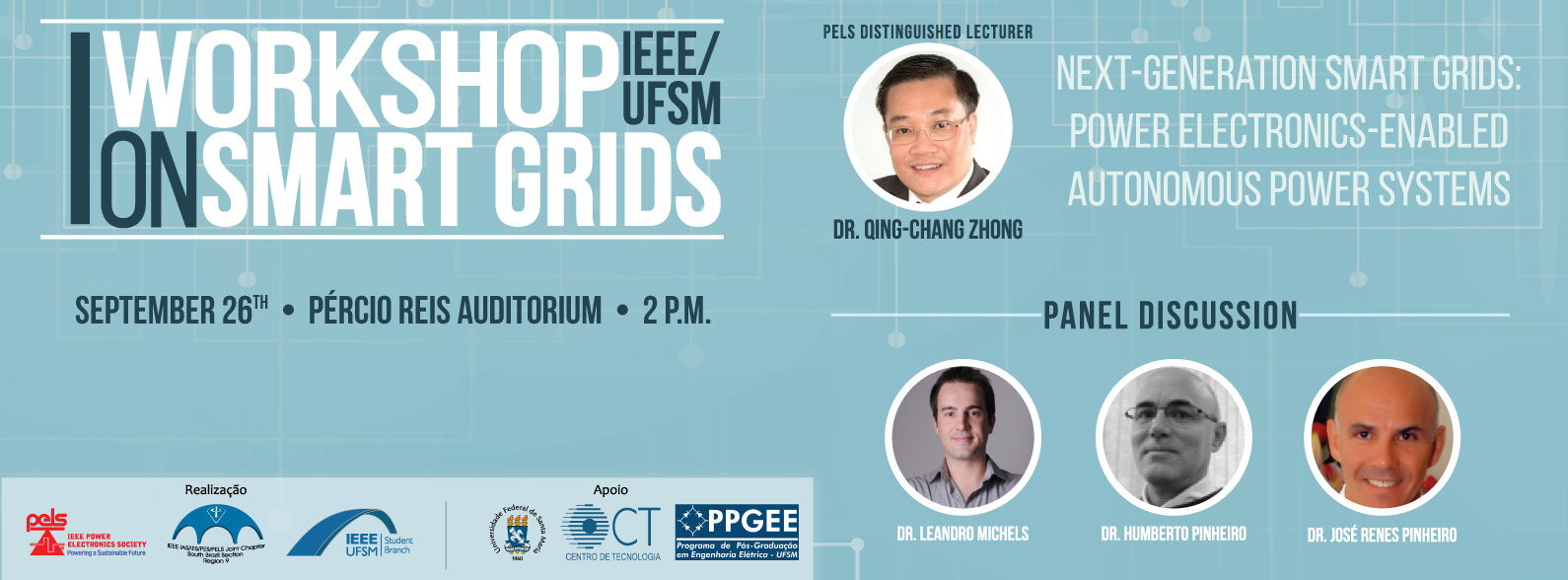Centro de Tecnologia - Auditório Pércio Reis - Santa Maria
26/09/2016 14:00 - 26/09/2016 18:00
Programação
Agenda
| 14:00 – 14:30 |
Opening Ceremony |
| 14:30 – 16:00 |
Next-Generation Smart Grids: Power Electronics-Enabled Autonomous Power Systems – IEEE PELS DL – Dr. Qing-Chang Zhong |
| 16:00 – 16:30 |
Break |
| 16:30 – 17:30 |
Panel Discussion: Next-Generation on Smart Grids Chair: Prof. Dr. José Renes Pinheiro Invited Speakers:
|
Prof. Qing-Chang Zhong
McGraw Endowed Chair Professor in Energy and Power Engineering
Illinois Institute of Technology, Chicago, USA
 Dr. Qing-Chang Zhong holds the Max McGraw Endowed Chair Professor in Energy and Power Engineering at Dept. of Electrical and Computer Engineering, Illinois Institute of Technology, Chicago, USA. He is well recognized worldwide as one of very few leading experts in both control and power electronics, serving as a Distinguished Lecturer for both the IEEE Power Electronics Society and the IEEE Control Systems Society. Before joining Illinois Institute of Technology, he was the Chair Professor in Control and Systems Engineering at the University of Sheffield, UK, where he built up a $5M+ research lab dedicated to the control of energy and power systems and attracted the support of Rolls-Royce, National Instruments, Texas Instruments, Siemens, ALSTOM, Turbo Power Systems, Chroma, Yokagawa, OPAL RT and other organizations. He obtained a PhD degree in 2000 from Shanghai Jiao-Tong University and another PhD degree in 2004 from Imperial College London (awarded the Best Doctoral Thesis Prize). He (co-)authored three research monographs, including Robust Control of Time-delay Systems (Springer, 2006) and a No. 7 Amazon Best Seller Control of Power Inverters in Renewable Energy and Smart Grid Integration (Wiley-IEEE Press, 2013). His fourth book on Next Generation of Smart Grids will be published by Wiley-IEEE in 2017. He is an Associate Editor for 7 leading journals in control and power electronics, including IEEE Trans. on Power Electronics, IEEE Trans. on Industrial Electronics, IEEE Trans. on Automatic Control, and IEEE Trans. on Control Systems Technology. His current research focuses on power electronics, advanced control theory and the integration of both to address fundamental challenges in various energy and power systems.
Dr. Qing-Chang Zhong holds the Max McGraw Endowed Chair Professor in Energy and Power Engineering at Dept. of Electrical and Computer Engineering, Illinois Institute of Technology, Chicago, USA. He is well recognized worldwide as one of very few leading experts in both control and power electronics, serving as a Distinguished Lecturer for both the IEEE Power Electronics Society and the IEEE Control Systems Society. Before joining Illinois Institute of Technology, he was the Chair Professor in Control and Systems Engineering at the University of Sheffield, UK, where he built up a $5M+ research lab dedicated to the control of energy and power systems and attracted the support of Rolls-Royce, National Instruments, Texas Instruments, Siemens, ALSTOM, Turbo Power Systems, Chroma, Yokagawa, OPAL RT and other organizations. He obtained a PhD degree in 2000 from Shanghai Jiao-Tong University and another PhD degree in 2004 from Imperial College London (awarded the Best Doctoral Thesis Prize). He (co-)authored three research monographs, including Robust Control of Time-delay Systems (Springer, 2006) and a No. 7 Amazon Best Seller Control of Power Inverters in Renewable Energy and Smart Grid Integration (Wiley-IEEE Press, 2013). His fourth book on Next Generation of Smart Grids will be published by Wiley-IEEE in 2017. He is an Associate Editor for 7 leading journals in control and power electronics, including IEEE Trans. on Power Electronics, IEEE Trans. on Industrial Electronics, IEEE Trans. on Automatic Control, and IEEE Trans. on Control Systems Technology. His current research focuses on power electronics, advanced control theory and the integration of both to address fundamental challenges in various energy and power systems.
Title: Next-Generation Smart Grids: Power Electronics-Enabled Autonomous Power Systems
Abstract: Power systems are going through a paradigm change. The centralized large facilities are being replaced by millions of widely dispersed relatively small renewable or alternative power plants, plug-in EVs, and energy storage units. Moreover, the majority of loads are expected to actively take part in the grid regulation in the same way as suppliers do. These bring unprecedented challenges to the operation of power systems. In this lecture, it will be shown at first that the fundamental challenge behind this paradigm change is that future power systems will be power electronics-based, instead of electric machines-based, with millions of heterogeneous players. Then, the system architecture, together with a technical route, will be presented to enable this paradigm change. It will be shown that the synchronization mechanism of conventional synchronous machines, which has underpinned the power systems for over 100 years, will continue playing its fundamental role in power systems. All power electronics-interfaced suppliers and loads can be controlled to behave like virtual synchronous machines so that they all take part in the regulation of system frequency and voltage, in the same way as conventional synchronous machines do. This will also release the communication infrastructure from low-level control and open up the prospect of achieving autonomous operation for power systems. Moreover, it will be shown that the phase-locked loops that have deemed to be indispensable for grid-tied converters can actually be removed. At the end, a brief overview of other research activities in control and power electronics will be presented.
Localização
Centro de Tecnologia - Auditório Pércio Reis
Roraima - 7 - Camobi - Auditório Pércio Reis
Santa Maria - Rio Grande do Sul

